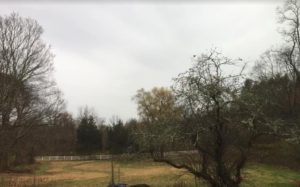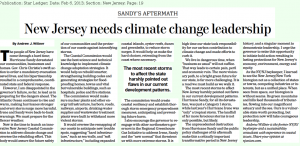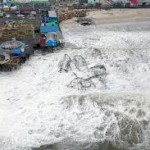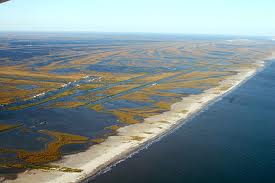I
The Moral Dilemma of Continued Fossil Fuel Use in an Age of Climate Change
Over the past decade we have seen horrific drought in California and Texas, India and Africa; record floods on the Mississippi and Missouri, in Britain, and Pakistan; the worst wildfires in history in the American West, Australia and Russia. Everywhere around the globe, climate change is bringing an unprecedented escalation in human suffering and economic harm.
And yet, the global average temperature has risen by a mere degree. Scientists tell us that if we do nothing, we could easily see twice as much, or 4 to 5 times more warming, by century’s end, fueling disastrous weather never before seen by civilization. Rapidly melting ice caps; rising sea levels; intensifying heat waves, super storms and mega droughts; acidifying oceans and dying coral reefs, collapsing water supplies, declining crop harvests, teeming eco-refugees and escalating global conflict are happening now, and going to get much worse, says the newest Intergovermental Panel on Climate Change report. The climate disasters endured so far, and dire events to come, threaten an unparalleled wave of human suffering — making climate change the dominant moral issue of the 21st century.
Our fossil fuel addiction, if unabated, endangers our children and their children — civilization itself. If President Obama is to respond to this crisis, he must do so now with the same moral courage and frankness with which Franklin Roosevelt faced the Great Depression and the fascists in World War II, and with which Lincoln dealt with the pro-slavery South.
President Obama’s legacy will clearly be judged on his ability to emancipate us from the economic and corporate tyranny of fossil fuels. This requires his directly challenging the lies of the climate deniers who have put us on the path to planetary ecocide — the “Oil Eight,” the Koch Brothers, and an uninformed or completely out of touch media, that is ruining our democracy with Citizen’s United and other political outrages, and wrecking our ecosystems and economy with fracking, the ta rsands Keystone XL pipeline, the BP Deepwater Horizon oil spill, and other offenses against humanity and nature.
As worldwide human suffering and the economic crisis brought by climate change deepens, the President must lead. He must decide whether our fossil fuel addiction is “right” or “wrong.” He must base the rightness and wrongness of this addiction not only on science or economics but on the principles of human justice. It is time for the President to direct moral outrage at the treacherous obfuscations of the fossil fuel industry and its calculated attack on our environment, our democracy, and on governments and habitat worldwide.
The President will not likely come to this decision or this declaration on his own. As with Roosevelt and Lincoln, Obama must be brought to the decision by the people. Activist Bill McKibben of 350.org argues convincingly that, “The fossil fuel industry is a rogue industry.” He declares that if these rogue corporations continue to have their way, “We stand to emit five times as much CO2 as even the most conservative government says is safe,” damning the civilized world. “The fuel will definitely be burned unless we change the story line.”
Only we, the American people, can change this story line. The new narrative we create must include the voices of farmers and farmworkers losing their crops and livelihoods to California’s drought; the ranchers who lost their herds to searing heat in Texas and Oklahoma; the Coloradans who lost their homes to record flood and fire; the citizens of Tuscaloosa and Joplin who lost their towns to tornadoes; the people of Far Rockaway, New York, and New Orleans who lost their communities to hurricanes Sandy and Katrina.
This new narrative, directly connecting unprecedented human suffering to climate change, will not arise out of international conferences or on the floor of Congress. Instead it will push up from the bottom. This new story line must come from the heart, be as unyielding in its principles, and as unflinching in its sense of moral indignation as was William Lloyd Garrison when he demanded slavery’s abolition in 1831. Garrison wrote in the Liberator:
“I will be as harsh as truth, and as uncompromising as justice. On this subject, I do not wish to think, or speak, or write with moderation. No! No! Tell a man whose house is on fire, to give a moderate alarm: tell him to moderately rescue his wife from the hands of the ravisher; tell the mother to gradually extricate her babe from the fire into which it has fallen; but urge me not to use moderation in a cause like the present. I am in earnest — I will not equivocate — I will not excuse — I will not retreat a single inch — and I will be heard.”.
The future of our children is in the balance. Life on this earth is at risk. As our world teeters on the edge of catastrophic climate change, we must demand that President Obama lead. He must oppose the morally corrupt fossil fuel industry with the courage of one who carries forward the flag in a just cause, serving all humankind. The President must commit us to building America’s future and the world’s future on a new, sane, sustainable economic footing. This is what he should say:
Emancipation from Fossil Fuels: A New Birth of Freedom
Most of the links in blue indicate that the entire paragraph is a quote from the President or other world leaders
Mr. Speaker, Mr. Vice President, Members of Congress, fellow citizens: Good evening, I come before the Congress and the People of the United States tonight because no country can hide from the horrific harm of carbon pollution, the corrupting influence of the fossil fuel industry, their paid denier minions, or the reality of the great danger we face as a nation. Continue reading →





